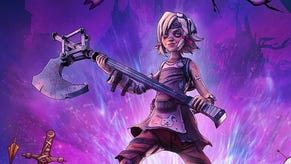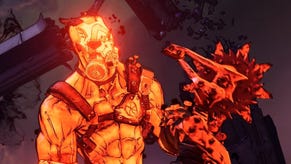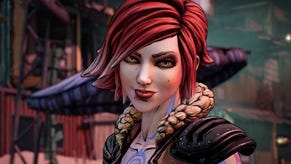Randy Pitchford Beats the Devil
How the studio head's tricksy blend of showmanship and strategy has helped define Gearbox Software.
The force is a beautiful, infuriating, mesmerising thing. It's often drafted in to provide the true high-wire moment in a really good card trick, and it's the kind of technique that novice magicians struggle for years to perfect.
A force is the part of a magic show where you ask a member of the audience to pick a card, any card, and then, through a mixture of watchfulness, psychology and dexterity, ensure that the card they end up selecting is the very card that you've had in mind for them all along. Even if you know how it's done, it remains an astonishing feat of skill. Even when you've unravelled it, it's still magic.
Randy Pitchford's the president of Gearbox Software, and as a professional magician, he's pretty good with forces. When I meet him in a restaurant on a drizzly morning just before his appearance at Rezzed in Brighton, I ask him to perform one for me: he does, and it's dazzling. In Pitchford's force, the pack is always moving, spreading lazily outwards as the mark's hand quavers above it. The mark is hesitant, and Pitchford is self-assured and chatty. There's no question that it's going to work.

Before Pitchford became a game designer who's always being asked about magic tricks in interviews - "Nobody's asked me anything about cards in at least a week," he tells me, "let's do it" - he was a real, jobbing magician in Southern California. His great uncle was Richard Pitchford, the Great Cardini - I strongly urge you to search around on YouTube - and although Pitchford Jr. has no memory of him, he grew up surrounded by the aura and ephemera of his famous relative, fascinated with close-up magic as a result of the blood connection.
"He died when I was very young," says Pitchford. "I ended up with some of the books: the more legitimate stuff. As a teenager I walked around with coins in my hand, just playing with them. I grew up on the coast of California, and when I moved to Los Angeles, that's where the Magic Castle is. That's like Mecca, and I wanted to become a part of that scene.
"When I turned 21 - you have to be an adult to enter the Castle - I auditioned," he continues, settling back into a well practised yarn. "There were nine other people auditioning with me, and I remember it was really nerve-wracking. They put you in this dark room, and then they call you alphabetically. Even though I'm a P, I was the last one. Everyone comes back looking dishevelled, and I'm thinking, 'What the hell is going on down there?' Nobody's talking.
"I finally go down and there's the review board. There's like eight or 12 guys down there, some of these guys that I really knew about. They're gonna watch me and decide whether I'm good enough to join their circle. They say, 'OK, you have 10 minutes.' My style's very interactive and I have to play off the crowd, and they just don't react at all. Nothing. I did my routine, then they sent me away, and then they deliberated. They call us down, individually, in the same order, so I'm last again. Everyone else gets rejected, and then they said, 'You're in, and we'd like to book you.'"
I ask Pitchford if he can remember the act he performed for them. "I had this routine I developed as an original thing. Have you ever seen Who Framed Roger Rabbit? I love that movie, and there's a part in it where there's a big fight in the warehouse and he pulls out this black disk, which is a portable hole. My idea was to come up with a routine where that was real. I had this piece of black felt, and I'd do all these things where I'd throw a coin in, see it disappear, and then coins would come in and out, multiply, and then, of course, a big coin production at the end.
"It was a cool little routine, and I think there were a couple of things about it. I actually had a bit of skill, I think. Because I'd only ever relied upon regular props - normal cards, normal coins - I had to fool people through manipulation. And because I'd worked on my own routine for so long, a lot of it was original stuff. Once you understand the principles - how to grab someone and pull them through a line of logic so that you can then break that line for a sense of wonder - you start to naturally get your own moves and your own techniques."
"It's the same deal [with the audience] in games and in magic. You never talk about that deal, but it's there. And to master that deal, you really have to get into the head of your audience."
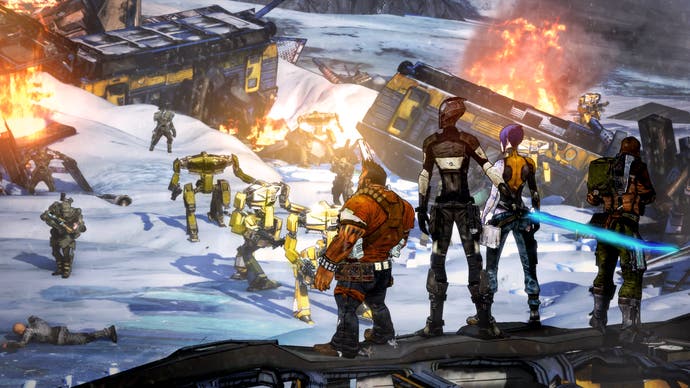
I've seen Pitchford perform, in a manner of speaking: it was at E3 in 2009. He was demoing the original Borderlands, and his presentation was a sprightly piece of theatre, with the fast-talking developer providing light, enthusiastic commentary for the crazed action unravelling on the HD screen. Skags were crushed under tyres, badass shotgun midgets ran around in flames and Pitchford himself seemed as delighted and surprised by what was going on as the audience were.
"I'm an entertainer at heart," Pitchford likes to say, and his first career has been an excellent primer for his second. It's an obvious point, but the connections remain too interesting to gloss over. Magic, after all, is the same mixture of showmanship, spectacle, and craftiness that often defines video games. Manipulation, misdirection: there are plenty of transferable skills here, right?
"A lot of the skills are the same," agrees Pitchford. "In a video game what we're presenting is not real, and we have to make the same deal with the audience that the magicians make. The deal is: Listen, I'm gonna lead you somewhere. Just come with me, trust me, come along with where I'm going to lead you, and if you follow my line of logic, if you come along with me, there will be a pay-off, there will be a reward. It's the same deal in games and in magic. You never talk about that deal, but it's there. And to master that deal, you really have to get into the head of your audience."
Is there something else, too? Magic tricks tend to be made up of a handful of fairly simple components - forces, palms, false-shuffles - and the skill comes from how you find new arrangements for existing elements. Has magic's thriftiness helped Gearbox when it comes to putting new projects together or - as with Borderlands - splicing unusual genres?
"Before I answer this, I do want to explain that at my studio, we have about 210 people and everything is a team effort," says Pitchford, rather warily. "I'm the most accountable, and I'm also responsible for the culture of the team, and I am a craftsman, but it's really irresponsible for me to suggest that I make everything." He relaxes a little. "That said, there is something of what I love in my magic and in our games. There's a lot of magicians who learn an old routine and could do it very expertly, but anybody could really do that with enough effort. At Gearbox, I think it's very important that we bring something unique to it: we bring something new to the trick. Even when we're working with someone else's property."
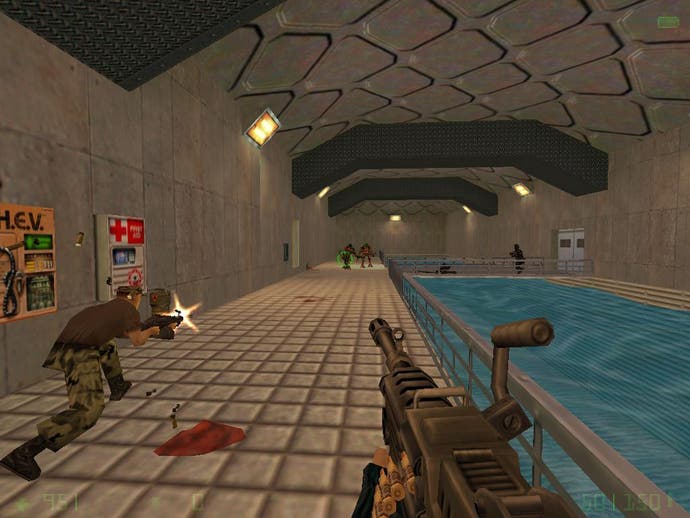
Gearbox has had quite a bit of experience working with other peoples' properties. Since the studio's founding in 1999, it's done plenty of work with ports and add-ons, and it kicked things off with style, working on the Half-Life expansion, Opposing Force. "I loved spending time in that brilliant Half-Life universe," says Pitchford, "but we really wanted to try something there and turn it on its head. What would it be like to take one of the soldiers, to be that character? And can you take something that you expect to be a villain, and see him fighting for his own survival, and ending up in a similar situation to Gordon? You know, he's gone in to exterminate the scientists, and yet he becomes someone who is struggling along with them."
This kind of contract work wasn't the main reason Pitchford and his colleagues founded a new studio, perhaps, but it was certainly part of the plan. "I wanted to make sure that while we were definitely going to build new things, we were also releasing stuff," he says. "It takes a long time to build original things, and there's also a lot of cool stuff in the world that other people make. Things that have inspired us or are just neat. We figured, if there were things that we wanted and there was a business case for it, we wanted the credibility to be trusted with other peoples' property. We wanted to ship. We wanted relevant things going out at a regular pace.
"Doing things isn't just about trying really hard. It's about throwing things out there and being judged." He sighs. "As a magician, you can watch the audience in real time and adapt to that dynamically. In video games, imagine trying to work for four years on something, not knowing about the quality of your decisions. Then, by the time you get the feedback finally, you've forgotten all your decisions. That loop is really dangerous. Half-Life and porting stuff was really, really helpful."
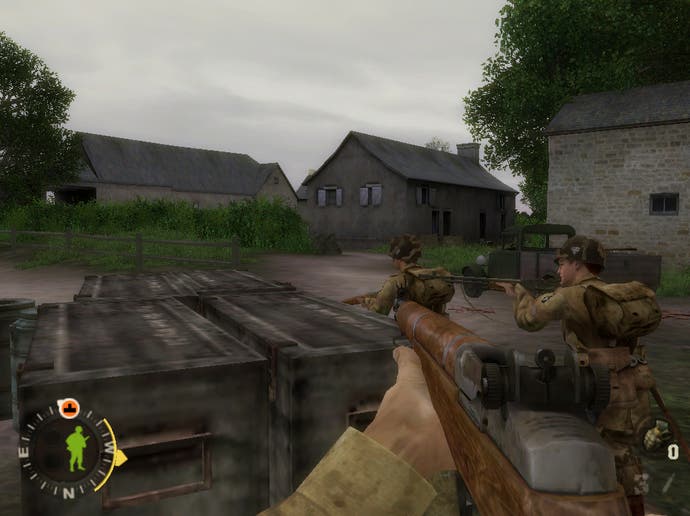
Brothers in Arms: Road to Hill 30 was the first of the studio's projects that could be classed a Gearbox game from the ground up - a thoughtful tactical FPS set in and around D-Day. Its focus on suppression, squad-control and flanking make it feel as much of a puzzle game as a shooter, while its air of historical seriousness helps mark it out from other WW2 blasters.
The game had its genesis in conversations between Pitchford and Brian Martel, whom he met when both were working at 3D Realms. "We used to talk about how in typical shooters there's only one protagonist and the enemies are asleep until you enter the room. We got to thinking about how good it would be if you could do something a bit more complicated, that had deference to history and showed the complexity, but instead of the strategic view, you could actually be in the war as a person. When we started Gearbox, that came up again because the technology made it feel possible. We decided to really go for it."
Gearbox worked closely with Colonel John Antal, a military historian and tactician, and the main objective was to capture a more human side of conflict. "I've talked to vets and to people who have been in the war," explains Pitchford. "What I learned was, when you're in the shit, when you've got to get up and face the incoming fire, and raise your weapon, ultimately with the aim of killing the other guy, what ultimately drove these guys, what stopped them from cowering or running or failing? It wasn't about duty or honour, it was about the guy next to them. None of them wanted to be cowards. None of them wanted to let their buddies down. When we heard that, we realised that had to be the core of the game. That's what Brothers in Arms had to get at."
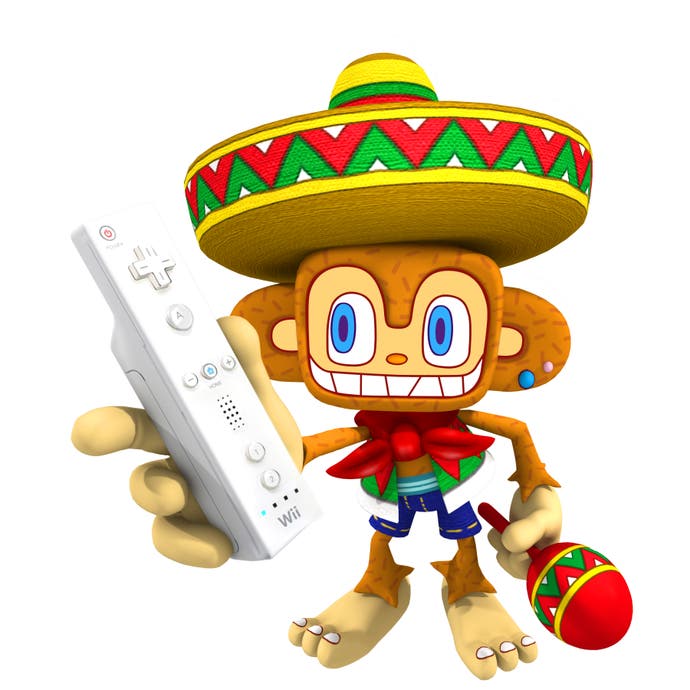
Pitchford's a confident storyteller who can bring an old project alive with just the right anecdote, and even though you know he's probably honed each gambit over dozens of different interviews, he manages to hide any traces of an internal script. His sense of showmanship is only one facet of what he lends Gearbox, however - and some of the porting work the team has done over the years drives this point home most clearly. Take Samba de Amigo for the Wii as an example: there's a sweet little tale behind its development, but there's sound business sense ticking away too.
The tale first. "When the Dreamcast launched, Samba de Amigo was the first music game that was really good and that you could take home," enthuses Pitchford. "We loved it. We'd have tournaments at Gearbox and we'd play it during lunch. We'd always been Nintendo fanboys, and when Nintendo briefed us about their new platform, the Wii, the pitch with the controls made us think, 'Dude, this is like a console designed for Samba de Amigo.'
"I called up Sega and I said, 'You guys are doing this, right? Because I want to play it.' They were like, 'What?' I said, 'What? You're not doing it? I'll do it. This has to exist.' They said, 'Listen, that's great, but this is a Japanese company, you're a Western developer.' I said, 'Let me talk to them.' When I proved I could beat everyone at Sega on Samba de Amigo, they were like, 'Okay, he knows the game better than us even. Why not?'"
Pitchford wasn't just driven by enthusiasm, though. There was a little more going on. "What else was cool was that, before anyone really knew what the Wii was going to be, it allowed us to play in that space a little bit," he says. "There was something about playing games at home with peripherals that you'd usually only have in arcades that felt like that was going to be a thing.
"How was it going to work? Don't know. Let's try and get something working there. Also, the Wii? This is pretty clever and I have a feeling a lot of people are going to get one. I have a feeling that I'm not going to play certain kinds of the games I like on it, but it could be really big, so let's try and get in there a little bit just in case, and let's get in there in a way that's natural... There were also neat opportunities to do a game on that platform that did DLC. It may not look like Gearbox at first, but there were a lot of reasons why we did it."
The feel-good folksy narrative and the more sober motives of an employer would dovetail once again on 3D Realms' Duke Nukem Forever, which Gearbox saved from the abyss in 2010 - even if few people truly ended up feeling all that good about this this time around.
"In the end [Duke Nukem Forever got] maybe too much attention, though. It's just this silly thing. Imagine if, when The Hangover 2 is coming out, it's getting as much attention as Citizen Kane."
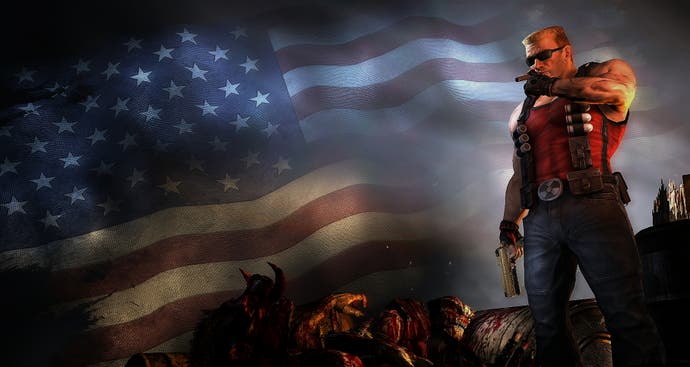
Forever was a rare point at which Pitchford's famous charm faltered, in fact - and his relationship with certain parts of the press, at least, has been rather prickly ever since. It wasn't surprising that a game with such a tortured development should feel so scrappy or outdated upon its release, perhaps, but Pitchford's bullish enthusiasm for it in the last few months before it came out encouraged players to hope that it could be something really special after all. Misdirection? Manipulation? Was the magician trying another force?
"Personally, I adore it," laughs Pitchford, who actually worked at 3D Realms between 1995 and 1997. "I think it's brilliant, and I was astonished, when I dug into what they'd made, to see what was there. And they had a complete game's worth of stuff, that's what was there."
He's eager to highlight an important distinction, however: Gearbox finished the game off, but it didn't make any of the creative decisions. "There's a huge amount of effort that goes into making something that works on a customer's machine, whether that's console or PC. That's what we brought. We brought production. But when you play the game, it's Gearbox Software presenting a 3D Realms game.
"That's the whole point. If it had been Gearbox's game, it wouldn't have been called Duke Nukem Forever. Duke Nukem Forever is that game. I think it's hilarious, and I do really love it. I was delighted to be able to help make sure that game exists and I'm very proud of it."
I ask Pitchford exactly what it is he loves about the game, and he thinks for a few seconds before answering. "The character is one of a kind," he says. "He's not a man I respect, but he's a man that amuses me. There are things that he does that you just can't do, that you just can't get away with, and I find that very amusing in a cynical and sarcastic kind of way.
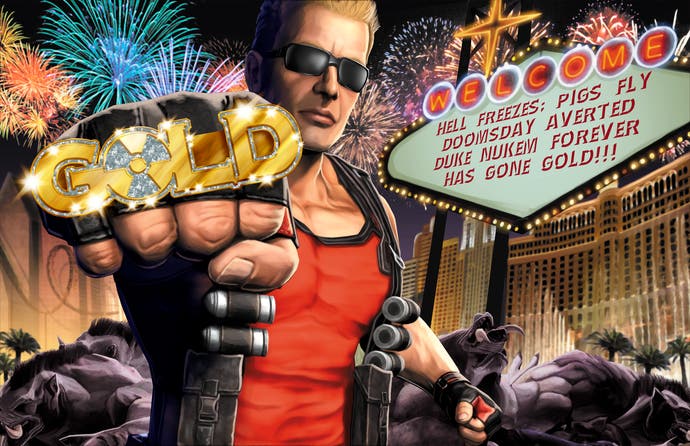
"He's just a ridiculous man. He's got these girlfriends who are half his age and wear schoolgirl costumes. When he finds them in the alien hive, and they're doomed and they're begging for their lives, his reaction is just, 'Well, looks like you're f***ed.' What kind of an asshole does that?
"Then, when you think about the gameplay sequences: you're in the Duke Burger and you get shrunk down and you're mini-Duke, and then you ride the toast popping out of the toaster? These are environmental navigational puzzles, the same kind of stuff that's done in Duke 3D and Half-Life, and it's just turned on its head in this twisted, fun-house mirror. It's a warped reflection of the pseudo reality of Duke 3D. He has a museum to himself and he has a throne. Who has a f***ing throne?
"There's just nothing like it in the world. It's charming in its uniqueness, and I thought there were a lot of clever designs and puzzles. There were times I was tested and times I was surprised. It's a game that's 15 years in the making, and the people who made it wanted it to be the best game ever. There's no hope of living up to that kind of thing, but if you take it for what it is, when I played it - I was just astonished there was anything at all. The fact that there's not only a lot there, but that they were really committed to the absurdity of that character? I love it. And then when you add to it the history of the project, the fact that it's the longest game development in the world, that will never happen again. And how could it?"
Duke Nukem Forever was only part of the deal, of course. Gearbox bought the IP as well as the game - and the IP is the true prize. "I did not acquire the Duke Nukem brand just to make sure Duke Nukem Forever launched," Pitchford laughs. "There was an opportunity there. And, by the way, one of the other things that Duke proved is: what a powerful brand. Holy crap. Everyone turned their heads. You had to watch. You had to turn your head and look. I would have given some part of my body to get that kind of attention on Borderlands 1, trying to get anyone to notice this cool thing you've got.
"In the end it was maybe too much attention, though. It's just this silly thing. Imagine if, when The Hangover 2 is coming out, it's getting as much attention as Citizen Kane. Dude, it's The Hangover 2, okay? Seriously guy. That's the world we're in, but what a neat thing to know it can get that attention. I'm not announcing a new game here, but clearly we'll want to make a Gearbox Duke Nukem game."
That last part may be one reason why Forever's failings sting so much, in fact. A real disappointment for veterans of Gearbox's own output wasn't that the game was rough, anachronistic and frequently offensive, but that it didn't have the sharp, knowing wit you get from something like Borderlands. It lacked the white trash smarts where everyone's in on the joke - and that could have been a great fit for Duke.
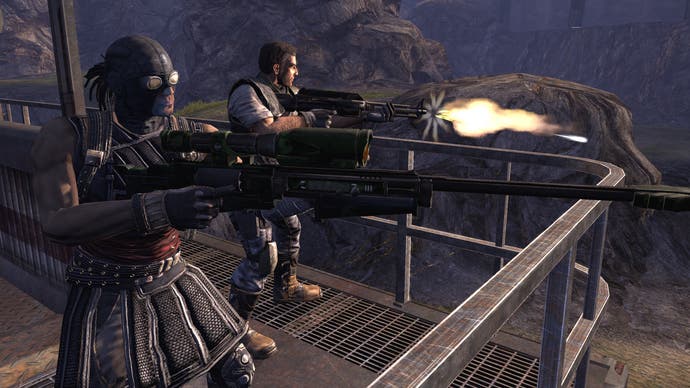
Borderlands almost didn't have these elements either, incidentally. By now, the game's eleventh-hour art-style change is a story as well-worn as Pitchford's own days as a jobbing magician, but it's equally worth going over one more time. If nothing else, it's astonishing that a studio working on a major release could switch styles - from bland realism to a kind of punkish, graphic novel surrealism - after so much work had been completed.
"The fundamental personality of Borderlands begs for this attitude," argues Pitchford. "On one level, you do this concept art, and your concept art's always crazy and brilliant. The analogy I use is the auto industry, when you build a concept car and it's sick and amazing and awesome. But they never build the concept car for us, do they? By the time they build the car for us, shit happens along the way, and it gets boiled down to a simple thing that looks like everything else.
"We were doing the same thing. When time and effort and money is going into it, you get scared of all the other stuff, and that's where the realism comes from. Even when the game was realistic, though, we still had that Borderlands attitude. Matt Armstrong, the director, called the cash 'cash-money', which is a whole attitude thing, and we didn't have elites, we had 'badass' enemies. That stuff was all there, but it was being suppressed. The personality of the game couldn't come through. It was actually Brian who led the revolution: let's not distil everything down, for once. Let's build the concept car!"
The gamble paid off, and a game that was perhaps slipping under people's radars went on to be that year's surprise hit. Its affect on Gearbox's profile has been enormous. The team once known for porting Halo or Half-Life or quietly toiling away on straight-laced WW2 shooters is now famous for making one of mainstream gaming's rare successful comedies: a blend of shooting and RPG progression that feels both characterful and harmonious.
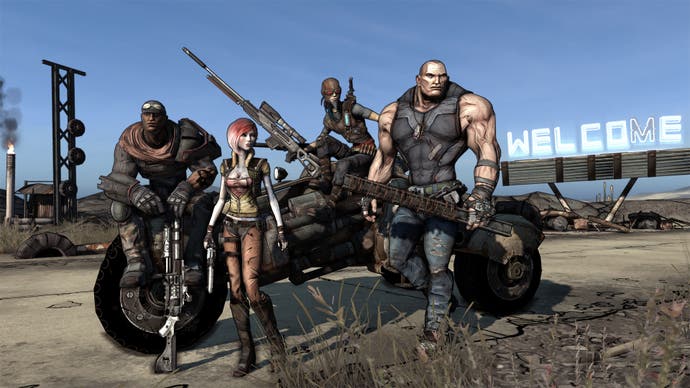
Pitchford's now a famous studio head, too - and he has to deal with the things famous studio heads must sometimes deal with. These include the conflation of his public persona with his company's entire output and the disappointment that arises when a big project like Duke Nukem Forever doesn't live up to the - admittedly rather unusual - hype.
Magicians are used to playing a role, of course. Is there a point at which folksy charm becomes a form of armour? Pitchford's a performer, and that's one of the reasons gaming websites and magazines find him so interesting: it would be stunning if he wasn't having at least a little trouble transitioning from the equivalent of close-up magic to really big stage productions.
It's an interesting time for Gearbox, what with Aliens: Colonial Marines in the works for 2013 and a sequel to Borderlands itself out this week. Bigger budgets, bigger advertising spends, higher expectations: as our interview winds up, I ask Pitchford if he's ever kind of frightened by these much higher stakes. The first Borderlands was made by a small team, after all, and the analysts helpfully declared it DOA. This time it's a major game launch, and there are really serious amounts of money on the line.
"I get excited by the stakes," he says, leaning back in his chair. "I get excited by the investment. Maybe I'm an anomaly. I'm a guy who's not afraid to acquire Duke Nukem and be responsible for shipping Duke Nukem Forever. If I'm not afraid of that, well, what is this word 'fear'?"
Cue the smile. Cue the laugh. Cue the big coin production.





